Phantom of the Opera and the Problem of “Shipping”

The Phantom of the Opera, a quintessential Gothic melodrama, tells the story of a deformed genius, rejected and hated throughout his life, who secretly tutors a gifted singer mourning the death of her father, convincing her he is the ghost of her dead father, becoming obsessed with her in the process. Complications ensue when her childhood sweetheart returns to her the night of her triumphant debut and the romance is rekindled. Maddened by jealousy, the Phantom unleashes a reign of terror upon the Opera house, before kidnapping the object of his obsession. Only the compassion of Christine prevents him from killing her fiance, letting the two of them go, and thus dying alone.
It’s clear from a bare summary that the dramatic turning point of the story is the final ultimatum and how the two characters respond to it. Christine gives up her own happiness to save her beloved, going beyond what is required of her to offer herself as his “living bride”; the Phantom responds to her offer by releasing her and Raoul, shamed by her kindness. Both responses are unexpected, and thus yield unexpected result, bringing the story to completion with far greater emotional satisfaction than most narratives can boast, outside of fairy tales.
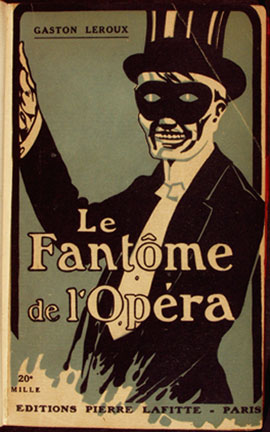
Still, the enduring popularity of The Phantom of the Opera, in the original novel and its multitudinous adaptations, remains something of an enigma. As both Sean Fitzpatrick (of Crisis magazine) and Lindsay Ellis (of YouTube fame) have pointed out, in contrast to similar stories such as Beauty and the Beast and The Hunchback of Notre Dame, the actual source material–Gaston Leroux’s 1911 novel–is more pulp fiction than great literature in its own right. Despite that, the musical genius obsessing over the beautiful young opera prodigy is an image still potent more than a hundred years since its publication, none more iconic than the white half mask of Andrew Lloyd Webber’s protagonist in his 1986 blockbuster musical. Channeling swooning romance novels as well as traditional gothic suspense, the tragic unrequited romance of the Phantom and Christine still elicits sighs and tears from its rabid fan base. But is this the reaction it should seek to inspire?
That is, most fans of the musical admit to “shipping” Christine and the Phantom together, due in no small part to the seductiveness exuded by the character himself through his big solos, and the sympathy lavished upon him by the surrounding narrative. But should they?
To explain: since the internet facilitated the widespread proliferation of “fandoms,” a curious phenomenon has emerged within these varied and sundry “fandoms,” oft-critiqued but popular nonetheless. Known as “shipping” (a contraction of “relationship’), it involves the desire for two characters within a work of fiction to come together romantically who (usually) don’t “canonically.” Often, this desire is expressed and expounded upon without regard to the actual events of the work or authorial intent, requiring either the vilification the hero or whitewashing the villain to make said fan’s desired pairing seem at all rational.

Most “phans” prefer the pairing of Christine with the charismatic antagonist, Erik (the Phantom), rather than her real beau, the rather less interesting Raoul de Chagny. Though consequences of revising the bittersweet ending to pair these two together can be seen with stark clarity in Lloyd Webber’s much reviled sequel, Love Never Dies, a more cogent critique can be made by leaving that dubious piece of musical theatre behind and instead exploring the relationships and story arcs of the “canonical” material.
The Phantom’s story works, despite what the musical might have us think, is due to one simple fact: Christine doesn’t love the Phantom. Throughout both the novel and the musical, she sees the Phantom as a guardian spirit, her “Angel of Music”, more akin to a mentor and father figure than a romantic interest. Her romantic feelings are only awakened by the return of her childhood sweetheart, Raoul, and the ensuing conflict stems from their inability to reciprocate their affections due to the Phantom’s influence. Whether Raoul is an appealing or interesting character is beside the point–she loves him, and not Erik. Despite his obsession with her, he’s a father figure at best, an abusive psychological tormentor at worst. Christine admires the man for his musical genius, pities the tragedy that forced him to such violent desperation, but fears the lengths he’ll undergo to win her.
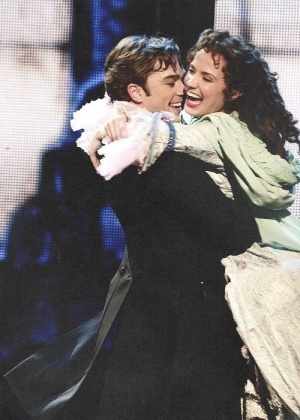
While she does appear somewhat open to his seductions in “Music of the Night”, there’s never a doubt she’ll choose Raoul over him. Her attraction to him is not romantic or sexual, but rather admiration of his musical ability, and pity for the disfigurement that ruined his life and distorted his character. Erik, again, is a mentor, a father figure (albeit in a twisted sort of way, using her love for her father to manipulate her), Raoul her childhood sweetheart, a man her own age who proves he loves and cares for her on multiple occasions, not the least in risking death to free her from the Phantom’s clutches. Considering Erik has lied to her, impersonated her father in order to seduce her, murdered innocent people and kidnapped her twice, it’s no real surprise that in the end she refuses to succumb to him, instead stepping out from his shadow and regaining her own agency.
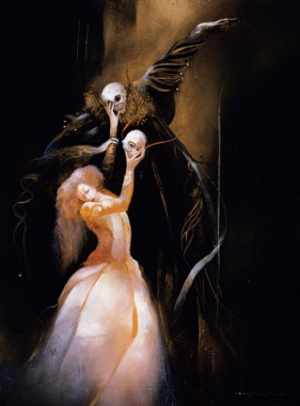
Perhaps, some in favor of this “ship” might concur, but what about the Phantom himself? Does he not demonstrate a deep and passionate love for Christine, a willingness to do anything to win his lady love? While this reading appeals to our post-Romantic sensibilities, with stories of the brooding loner who moves the heavens and earth to obtain the love of his lady, it fails when we consider what Erik lacks: love.
In both the novel and the musical, though all his thoughts and actions revolve around securing the affections of this unwitting opera singer, in truth Erik is never “in love” with Christine. At best we can say he’s “in lust” with her. Though emotion and passion form an integral part of love, love, to adopt definition derived from St. Thomas Aquinas and Bishop Robert Barron, is “willing the good of the other and doing something about it.” It’s intrinsically selfless and outwardly directed, rooted in the objective worth and dignity of the other person. Lust, on the other hand, seeks to posses the other for what pleasure the other can give to you. You cease to consider the other as a person, with objective worth dignity, and instead regard him (or her) as an object to posses in order to increase your own pleasure. While, in the novel at least, Erik seems curiously unconcerned with sex, his desires regarding Christine fall far more in line with lust than anything resembling authentic love.

Erik, as opposed to Raoul, never considers Christine’s happiness, what she might think or want. When he brings her to his lair, he tells her “since the moment I first heard you sing/I have needed you with me/To serve me, to sing for me” [emphasis mine]. He repeatedly contends “you alone can make my song take flight” [emphasis mine]. From the beginning, the relationship is all about him, what gratification she and her incomparable voice can give him. He wants to live a normal life: no one would marry him as is; thus, he lies to a young girl and, when she falls in love with someone else, he uses terror and murder to keep her in line. Even the pro bono musical training is more for himself than her, indulging his own ego in making this girl a star, worming his way into her affections in order to convince her to marry him later. The Phantom consistently uses her as an object for increasing his own pleasure and happiness, with no regard for her well-being, and doesn’t even recognize what he’s doing until he sees Christine do the opposite: relinquishing her own desires for the good of someone else. Only then can the Phantom undergo his redemption, which can only be effected by letting her go.
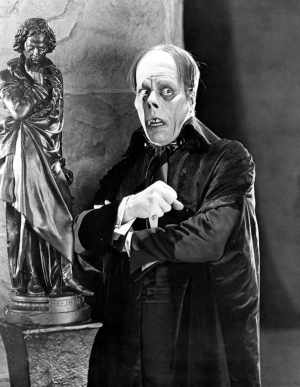
What inspires the sometimes misguided fan favoritism, however, outside of his sexualized charisma in the stage show, is not his disturbed and possessive behavior towards Christine, but rather his tragic character arc. Despite the “pulpy” surroundings, Phantom has endured thanks to the masterful portrayal of a tragic villain ultimately redeemed that Leroux places at the center of his novel. Return to the sacrifice she makes for the sake of her fiance and the hapless opera patrons: she never had to do what she does, but she did so others might live. The choice is entirely her own. Her selflessness allows Erik to see how selfish and abusive he really is, placing his desire to get what he wants through whatever means necessary in stark contrast with her willingness to throw away everything she wanted for the sake of others. Shamed by this revelation, he acquires something of the selflessness Christine has shown to him, and thus releases her from his control that she might pursue her own happiness, though it (literally) kills him. Erik begins his story emotionally stunted and selfishly immature, and ends knowing what real love is, first by receiving it, and then by giving it. Only by letting her go to marry the man she loves can he learn this fundamental lesson and, ironically, show her love.
The redemption arc of the Phantom and the growth of Christine as a person are, in truth, two narrative puzzle pieces that fit together. Christine cannot emerge from his shadow unless she willingly sacrifices her happiness for the sake of Raoul, and the Phantom cannot gain his redemption without first witnessing the calm sacrifice of the object of his obsession. Without the one, Christine lives in fear of this madman the rest of her life; without the other, the Phantom is not shown the base selfishness of his actions, thus inspiring him through he ensuing shame to let them go and relinquish his futile goal. Thus, in order for the story to “work” and come to an emotionally satisfying conclusion, they must go their separate ways.
That’s what makes the story so powerful, and, paradoxically, a great love story. He doesn’t “get the girl” as a conventional ending demands, but he ends up exemplifying what real love consists of–namely, a gift of self. He sacrifices everything he most wanted for the sake of the girl he strove so ardently to possess, and, in doing so, proved he now knew the essence of real love. Either way you slice it, the Phantom can have no character development or gain our final sympathy if he ends up with Christine. There is no way he can achieve his growth and come to emotional maturity if he gets what he tried to obtain through running roughshod over what the object of his affection actually wants. The entire idea of the relationship is impossible.
“Shipping” obliterates these character arcs. The whole point of the story is negated by trying to smoosh them together. That, indeed, is the tragedy of the Phantom of the Opera. He craves real, authentic love, without any idea of what it is or how to give it. Instead, he kidnaps and manipulates this young opera singer, thinking to find his happiness in romantic love, only to see, through her remarkable example, that the authentic love he sought requires him to give up she he most desired. Such a revelation is heartbreaking in the profoundest sense, and, while we wish he wouldn’t have to undergo such pain, real love necessitates sacrifice, which necessitates pain and heartbreak. The conclusion of the tale, while tragic, works due to its emotional honesty. Authentic love requires vulnerability, sacrifice: the conclusion of Phantom of the Opera doesn’t adhere to a standard Hollywood happy ending, but doing so would cheapen the sobering power of the Phantom’s story. Nothing could be simultaneously more heartbreaking, or more beautiful, than the resolution we’re given.
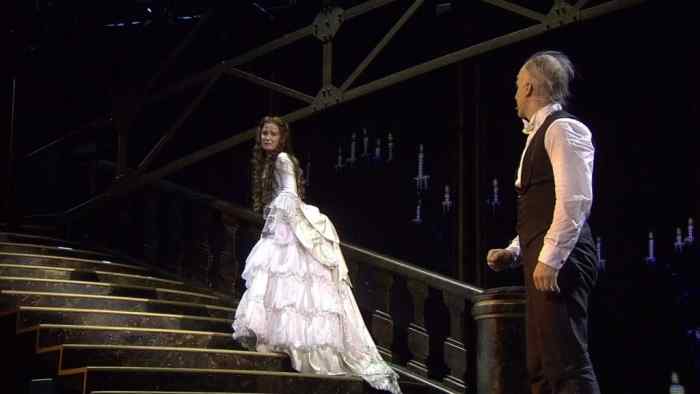
What do you think? Leave a comment.











It was more of a creeper/lover/father relationship than a I-love-you-more-than-your-voice type of thing like she had with Raoul who didn’t only love her for her voice.
Raoul seemed to love her only because she had become famous. In both book and movie there’s not much evidence to support that Raoul really loved her in any huge way.
I wouldn’t really put it that way…I don’t think he would have noticed her if she hadn’t been singing, but I do think he loved her, or at least, he loved being her hero. I don’t think he knew her well enough after years of separation to really love her.
Poor Erik. he had never know love of any kind. No mother love and no father at all. He had no idea what love was, but always knew he wanted it fiercely. When Christine came along he was ripe for it. Had any other girl been in the same position (his student) I think the result would have been the same.
That said, I have always been a believer that his experience with Christine awakened his need to be loved. But she was not the right one. Immature and naive, she would have had trouble accepting him. After all, she said he “has to kill 1000 men.”
It would take a woman of maturity and compassion to accept him, not only his disfigurement, but also his past. Christine was a child still. Maybe had she not been so young, or had something, time perhaps, intervened, and they met later, she might have had the maturity by then to accept him.
Your so right about Christine, Ying. Maybe things would have turned out differently if she was more mature,but I guess thats not how the author intended it to be:
One thing to support this idea: there are other fish in the sea.
Has anybody wonder about what’ll happen if Christine chose neither? I think it’ll be quite interesting to see how she would fare alone, without the both of them. As much as I love the song Devil Take the Hindmost, I really felt like Erik and Raoul were thinking of her as a prize, not a person.
I love this. It would be interesting to see how the “neither Erik nor Raoul” option would have played out…
A third option in the love triangle solution that is, regrettably, rarely explored. I think we just love “love” too much, even when it’s not right to a story or characters.
Passions running high, intensely emotional music and a poignant ending. A classic.
Christine loved Erik because he was her teacher, because he inspired her voice and because he loved her unconditionally. But she did not love him enough to want to stay, she stayed because she pitied him, because she knew of the pain he felt and so she stayed, until Raoul returned to her: then she wanted to leave him, but she was scared to because she knew how obsessively he cared for her and she knew that he would find her. She feared him because – lets face it, he was psycho. Because he had odd mood swings and she was not entirely sure of what he was capable of. She didnt want to stay with him because he was a psycho obsessive – what we call a stalker. I think that Erik was in love with Christine not in lust because if it had been pure lust he would not have treated her with the respect that he did. He let her go in the end not because he couldnt give her what Raoul could but because he knew she would never love him the way she did Raoul and so he knew she would be happier with him – he sacrificed his chance of happiness for hers. That’s love not lust. Lust is selfish, love is selfless.
Poor, unhappy Erik, his entire life was just a tragic, and lonely story…
I love reading about Erik. He is so twisted and a wonderful topic of discussion. Going to share this with my reading club!
It seems to me that Erik was only interested in controlling Christine’s love as opposed to actually loving her, so I can’t blame her for trying to get away from him. And while I think she ought to show more understanding to him once in a while, it’s hard to show it. He can’t help what he became, but his actions towards her were, let’s face it, abusive. It’s the only treatment he’d ever known, so why wouldn’t he treat someone else the same way?
He just wanted to be loved, but the world had turned him into something terrible! Dear Lord, it’s tragic no matter how you look at it!
Much as I would love it for the E/C relationship to work, it’s just not possible. Outside of fiction, that is.
I think Erik deserves someone better. 🙂
As much as I love Erik for all his faults he also had a heart..setting Christine free..you know the saying.”if you set something free and it comes back its yours..if not it never was..my heart breaks for him..but it never would have worked. Its why I like the sequels..so he finds his own happiness.
I don’t think Erik truly loves Christine until the end of the orignal novel, when he lets her go with Raoul. It is at this point he has matured as a character to see that love is not about ownership or controlling the other person’s every move. It is not about threats and intimidation.
As for Christine, she doesn’t have the emotional maturity to love the Phantom or really understand him. Her emotions are clouded by memories of her father.
While I love Erik I dont think he would have been the best choice..but I dont think Raoul was either.
In Phantom’s defense, he loved Christine before she was famous. Raoul only bothered to look in direction when she was such a success in on stage. And then Raoul just wanted to play hero and save Christine from someone Raoul couldn’t understand.
He had been alone so long, and was so scarred on the inside as well as the outside, that he had become obsessed with her. We all know that sometimes a woman, the “right” woman, can heal any wounds.
I love Erik, adore him, my heart breaks for him… but I’m not sure they could have had a healthy relationship.
This is a fascinating topic where people have conflicting opinions.
Christine, I find, was torn between what her heart yearned for and what she thought she needed. Her heart yearned to be met in music and it was Erik’s call that completed that. Erik had the same passion and emotional depth, whereas Raoul was a bit wooden in his character. He seemed to show only what he thought appropriate. Christine seemed like she was caught between what society expected of her and what she truly wanted. In the end, I think that she convinced herself that Raoul was the one for her, only because it seemed the easiest path to take. Sure, with Erik, they would have had more than their share of hardships, but there was an unyielding spark between them that would have fully ignited, had Raoul not got in the way. Christine made her choice and, honestly, I would have regretted it, if I were her. The Phantom has a certain allure to him that, obviously, Christine found seductive or else, she would not have come so easily under his spell. Spells break and so did Erik’s heart. Christine based her decision on her mind and not her heart and it makes me think that Christine did not deserve him.
I wonder if Christine had chosen Erik over Raoul, how would Love Never Dies be acted out and performed.
Erik’s past hurts/emotional baggage + Christine’s immaturity/emotional baggage = catastrophe.
My heart tells me that Christine had to love him so strongly that I am in the process of writing and publishing a phanfiction. I am going to reference this article in my work. Thank you for sharing.
Personally, I always thought Christine was a little two-timer who, instead of doing the right thing of just breaking the news of not really in love, decides to pull Erik along like a cat with a piece of yarn and talk horribly behind his back. Sure, telling someone like Erik that she’s not interested wouldn’t be a wise idea, but all she had to do was not return to his house on the lake. Erik specifically told her not to return unless she loved him, all like the Persian’s idea. What does she do? Come back.
I don’t think Erik loved Christine in a “Oh you’re my soul mate” kind of way, but more of an “I make sculptures of you on my spare time completely made of toothpicks” kind of way. Since he got to talk to Christine, as the Angel of Music, I think it gave him a taste of what it was like to have a woman admire him rather than be repulsed by his apperance (since even his own mother hated him) and it lead him on an obsession of wanting Christine. Yes, he was very kind to Christine during her stay at his house on the lake, but it’s more of an issue of people being repulsed by him, the desire to be loved by someone, and the yerning to live a normal life that caused his obsession rather than being that “special someone” or, as the movies LOVE to portray, lust.
Raoul, even though I really didn’t care for him, is probably the only decent one out of the love triangle. True, he’s thinking with his balls most of the time, but it’s the action you’d expect from his loved one telling him about this horrible person who won’t let them be together.
Very well thought out and put Allie. Never stop writing articles here.
If Erik had loved her, he WOULD NOT have kidnapped her, tried to kill her lover, and hypnotised and manipulated her.
Okay, I love that “Christine’s choice” ending scene. She can’t let Raoul die, but Raoul doesn’t want her stuck in Erik’s basement forever. The answer is to do the impossible: love the Phantom. Just a little bit, enough to kiss him. It’s not that Erik deserves her love, but he needs it (as a tragic character, he needs love more than most). Christine has enough love in her heart to love the Phantom; that’s what makes her a heroine.
So Erik doesn’t just learn to give real, mature, selfless love. He also gets it. It’s weird, because he always wanted it, but according to his plan it didn’t really matter if Christine loved him as long as she was his. When he got it in the end, he didn’t know what to do with it, so he had to let both Christine and Raoul go.
It’s not that shipping automatically destroys those character arcs. It’s just that shipping in the phanfiction sense cheapens one of the most powerful kisses in all of fiction.
I think Raoul’s love for Christine was a brotherly sort but Erik’s was much, much different and kinda hard to understand.
I think he really did love Christine, but having gone unloved all his life he really didn’t know how to express it in a healthy way. And since he considered her the one good thing that had ever happened to him, he would have been very obsessive and territorial over her. He didn’t learn the true meaning of love until that moment in the lair when he chose to give her up.
As much as it hurts to think of it, it still makes me proud to see how he’d grown from thinking of himself to doing what was best for her.
I wholeheartedly agree with everything here – I’m a long-time fan and this article sums up my feelings about POTO perfectly.
I’ll have to disagree about what people are saying in the comments about Raoul, though. I don’t think his love for Christine was shallow at all. One of the problems lies in the fact that Raoul doesn’t get much stage-time, but he’s known Christine ever since she was a child, when she was nothing else but the daughter of a poor violinist. Later on, he’s willing to do anything to protect Christine, even if it means dying at the hands of the Phantom, paralleling Christine’s own sense of sacrifice.
I can see him having a bit of a hero complex, but ultimately, it’s Christine who saves his life, by being willing to blow her own away. And that’s basically his character journey, for me.
I agree he can get a bit Prince Charming-ish, but I’ve come to a point where I find it endearing. I see him as a bit of a goofy human golden retriever puppy kind of character, nowadays.
I think what Erik felt for Christine is hard to explain: he did love her, but he never really understood that true love was to let go, and he only understands that at the story’s climax. As for Christine, I believe she did love Erik, but because she was that kind and compassionate, and not in a romantic way. And in the end, he felt loved, and he died happy because someone was kind enough to give him that scrap of love he never received. And that’s what makes his story tragic and fulfilling all at once.
I LOVE phantom of the opera. I think this article is really well written. I enjoyed reading your perspective on Christine and Phantom vs. Christine and Raoul.
Totally I totally agree with this analysis. Before watching the musical, I was under the impression that the main romance was between Christine and the Phantom. Then, as I watched the story unfold, I became more and more disturbed with that concept. Kind of like how Loki from the MCU is adored despite the fact that “he killed 80 people in 2 days”. I’m glad to see such a thoughtful and thorough breakdown of why there isn’t and shouldn’t be a romantic relationship between these two leads.
Thanks for the thought-provoking article. I’m a romantic, but I usually don’t “ship,” unless the “ship” is canon or has significant potential to become so. As you noted, “shipping” outside canon obliterates character arcs. Even though the characters aren’t real, I’d also argue it takes away their agency. That is, the writers have the right to do with their characters as they choose. The fans don’t. Fans are the audience, meant to glean entertainment from a work. We can analyze and theorize about what the author didn’t say all we want; that’s why analysis exists. But there is a point at which analysis goes too far. Shipping often reaches that point because we project either our own desires or our own context onto the character. (For example, some fans of historical pieces ship characters who, in their time, would never have come together because their relationships wouldn’t have been sanctioned. Tolerance for those relationships wouldn’t have existed, and as unfair as that is, there’s a real argument for respecting the canon in those cases).
“There is no way he can achieve his growth and come to emotional maturity if he gets what he tried to obtain through running roughshod over what the object of his affection actually wants. The entire idea of the relationship is impossible.”
I agree very much. Very good article. This quote I pulled in particular makes me wonder about other attractive, rogue male characters who never got refused.
You make a really great point about people’s choice to ship certain characters. I feel that fans often wouldn’t even like a character had they not rejected another and remained desirable, which makes the fan’s want to see the characters together moot… But that’s the point, I guess. Not having to think about it rationally is part of the appeal, ha ha.
I agree. The heartbreaking ending of The Phantom is what elevates the story from a mere love story to a tale where the Phantom’s true mask is peeled away, and his heart is opened and bared to the world. It will always be my favorite musical.
Very captivating photographs. A well-written and highly engaging rendition of the heart-wrenching tale. The ideas and the phrasing make this story ever more provocative.
Couldn’t have said it better myself. What we were giving was the only resolution that would have suited the story thematically. This is why Love Never Dies is a travesty. It completely undermines the characterization and the central message of the first story. There is no reason that I can’t think of that Christine would choose the phantom as a romantic partner. He is selfish, controlling, abusive. He retains all of these qualities in the sequel and he is rewarded with financial success,triumph over his rival (genuinely decent character who has been turned into a belligerent drunk),and the love of the woman he terrorized in the first show and continues to bully in the second. Not to mention, a new son that he has a rightful claim to, despite the fact, there is NOTHING to suggest that he would be a good parent. Christine’s compassion for the phantom has been replaced with mere lust for the phantom’s music and his charisma. It’s a disaster. I will admit that the music is good, but it isn’t enough to veil the issues with this sequel.
I am a fan of the Phantom, i think the music in movie is fascinated!
I agree with your article even though, yes, I do think Christine should have chosen Erik. I just had this conversation (one sided really as the person didn’t try and refute my points at all, but I digress) about why I do prefer Erik to Raoul.
Erik’s own mother shunned him, he was treated like shit by her, he was captured in a side show to be a freak, made to work for the Shah of Persia and torture people, and then, once he does find someone he feels at the very least a strong desire with, she rejects him? I would snap too honestly, after all that. He didn’t have a “regular” upbringing and he had only one chance for love and so he grabbed on and wouldn’t let go.
I am not condoning his actions; any sane Erik/Christine shipper won’t but we also know how his life was and why he did what he did. Raoul could have literally *any* woman, yet he wanted his childhood friend who he hadn’t seen for years. He wasn’t there for Christine after her father died; Erik was. Erik needed Christine more than Raoul did.
A very interesting you point here about the nature of “shipping”, fanfiction, and tragic stories. Fanfiction, by nature, fills in the holes of stories, changes them, and tends to make the original story more fulfilling for the fanfiction writer and for their audience. In writing about tragedy, however, these changes are difficult to do without sacrificing the core of the original story. Perhaps in a tragedy of misunderstanding, such revisions would be easier to do, but in a complex story like this, a writer would have a lot of work make their “ship” work out.
In order for Phantom to be rewritten in fanfiction while still remaining true to its core, the story would have to go back – back to the causes of the troubles, and rewrite those, in addition to the ending. This is a story without a clean ending, and so any fanfiction would have to work to delve into both the truth of the story and characters and remain true to the shipping.
It would be interesting to see, however, what would happen if this could be rewritten right!
Have I told you how much I love this article yet? You do a fantastic job of cutting through the “Erik Vs Raoul” romance war and saying “hey—there’s a story being told here about what love is. Let’s not be torn between two guys—let’s think about what they represent.” When we do that, it’s easy to see the beginning, middle, and end all structure around this theme of love Vs lust. It was interesting when you pointed out the language of the Phantom’s supposed “love” songs show selfishness and obsession. Is it passionate? Yes. Is it love?….No. And so to focus on shipping aspect is to be so swept up by passion that we ignore that theme and the fact that, as you say, the phantom’s act of mercy is the first demonstration of true love that he has made.
That tragic character growth most certainly makes for a fitting end therefore. Letting Raoul and her free was an act of love at the cost of his own happiness— so to say that he should have been with Christine is to entirely miss the point. That is IF he would even have been happy had she stayed with him. At this point she would have been his prisoner and it is difficult to imagine them being happy together given the circumstances. That was a fantasy in his own head.
I also like how you touch briefly on Love Never Dies. I had thought that maybe I just opposed it because I didn’t want there to be a sequel to such a classic, but you nailed it. Once again it is about the STORY of the Phantom of the Opera. The end makes for a neat conclusion, with the phantom’s epiphany and the theme of love being emotionally driven home. That’s taken away by opening the story back up with a continuation that seems like Erik took up writing self-indulgent fanfiction after things didn’t work out at the opera house.
-Constellation
This was a great article. I’m glad you established a basis of what “love” means in this context (it’s an often muddied part of discussions like these).
I haven’t seen or read any renditions of this work myself, but as someone who’s been witness to “ships” in other fandoms, I’m curious on how the Erik-Christine shippers transform the two characters in their fandom contributions (fiction, art, etc.). As you touched upon, it’s very rare for a character to be used in a ship and not have fundamental characteristics embellished, warped, or completely changed outright to become a more classically romantic character. The unfortunate part of this (I feel) is that it can often reduce the more distinct/unique character into a generic-feeling protagonist with their former identity acting more as their skin than as their soul.
I can already imagine a more handsome, less-scarred, and less-creepy Erik, and a more childish and asinine (or completely disregarded) Raoul. Does the fandom often create new works for Erik-Christine to star in? If so, to what extent do they change the characters?
Tired, condescending and pedantic argument. Please, lecture people more about how they should and should not enjoy fiction. We all want to be sure we’re doing it correctly! After all, if we like daydreaming about one outcome, it means the original source material will burst into flame and burn to ash, eradicating all that went before! Nobody will EVER be able to see “Phantom of the Opera,” any version, without a zillion daydreamed endings tacked on all in a row!
Are you getting how ludicrous this is now?
Also– if there were no reason to imagine how the Phantom’s love for Christine *might* have worked and given him happiness, then his sacrifice would not be as moving and compelling as it is. There has to be at least the illusion of hope. Without it, Erik is purely delusional and pathetic, and his sacrifice would be no more than his being forced to face what was always inevitable. Are the fans who see that illusion and love it misunderstanding the text? I’d argue they understand it better than you do.
Learn something about the core constructs of fiction before you lecture people again. And by all means, tell all of your future readers that they’re enjoying your work wrong. I think it will go VERY WELL for you.
(For the record, I’m not a shipper here. I don’t even like the Phantom of the Opera. But even less do I like flimsy superiority complexes paraded around by people who fail to fully engage with the story they claim to be expert on.)
I agree with the overall argument here, but if we are talking about the Lloyd Webber version of the story, then I’ve got to disagree with you on a couple of points. For one, there is no doubt in my mind that Christine was supposed to be attracted to the Phantom at some point during the musical, chiefly during the title song and Music of the Night sequences. In fact, I’d attribute her sexual awakening to the Phantom rather than Raoul in this version and some of the folks involved in the 2004 film adaptation have even corroborated as much, explaining that the changes in Emmy Rossum’s makeup that take place as the title track scene progresses, were intended to make her look less and less virginal as she loses her innocence. Also note how the final cadenza of the song builds pseudo-orgasmically.
I also strongly disagree with your argument that Erik never truly loved Christine. I’ll grant that for the vast majority of the show’s runtime, he merely exhibits his selfish, obsessive desire to possess her by any means necessary, rather than any sort of authentic love. Ultimately, though, he unselfishly releases her, demonstrating that he cares enough about her to put her needs before his, even though letting her go will probably be the most painful experience of his life. I can’t think of a much more valid and authentic display of true love than that. I think it’s also noteworthy that Lloyd Webber doesn’t have Erik say he loves Christine until after he makes this redemptive sacrifice, as if he hadn’t earned the right until that moment.
Thanks for tearing up a fandom in one foul stroke. Good job. We do know this shit, we just choose to let our fantasies unwind rather than repress others.
Going to be very blunt about this, but * get off the moral high horse.
I read the original Leroux novel, unabridged. In there, both Phantom and Christine’s feelings for each other are…complicated. Especially on Christine’s end, there’s definitely sexual attraction. The first unmasking scene in the original text has Christine and the Phantom sing parts out of Othello, and Christine is fascinated and drawn in by the danger in his voice, and she only removes the mask because she wants to see what the man she’s attracted to looks like. The ensuing Don Juan scene also has her being attracted to, if not aroused by, the way he has elevated his entire miserable life into something beautiful and cathartic via the music. The Phantom’s preoccupation with death is also much more emphasized in the Leroux text. During the unmasking, he talks about expanding his coffin to fit two, and during the final ultimatum, he begins by laughing like a demon, and ends exhausted and resolved to die. He’s an incarnation of the 19th century fascination with death. And, even in the abridged translations, it’s clear how Christine and the Phantom inspire and shape each other’s art. Through their love for music, and through the supernatural qualities the Phantom takes up, first as a ghost, then an angel, then a living corpse that drags Christine below the bowels of the earth, the two of them end up connected on a spiritual level, while her love for Raoul is more earthly and, in many ways, more childish.
Another aspect that Leroux seems to continuously emphasize is that all three members of the love triangle are children, and all of them need to learn how to love and grow beyond childish infatuation. The Phantom is often called “childish” and Raoul and Christine are described as children. By the end, Raoul has learned to let Christine make her own decisions, the Phantom has learned to put others’ happiness before his own, and Christine has had some sort of sexual/romantic awakening. However, I feel Raoul is less developed than the other two. Much of the book he runs around not knowing what’s really going on, and passively reacts to the decisions that Christine or the Phantom makes. His most distinct trait is that he wants to protect Christine, but even that fails as Christine is the one who has to protect him. He’s like a reward set up for Christine after she finishes dealing with the Phantom’s destructive love. Phantom lets go of Christine by the end and sacrifices himself for love, but who’s to say Christine isn’t also letting the Phantom go? She has to relinquish the dark fantasy to go back into reality with Raoul, and in doing so, both their special statuses–his noble titles, her career as a singer–are obliterated, and they become humdrum everyday rural folk.